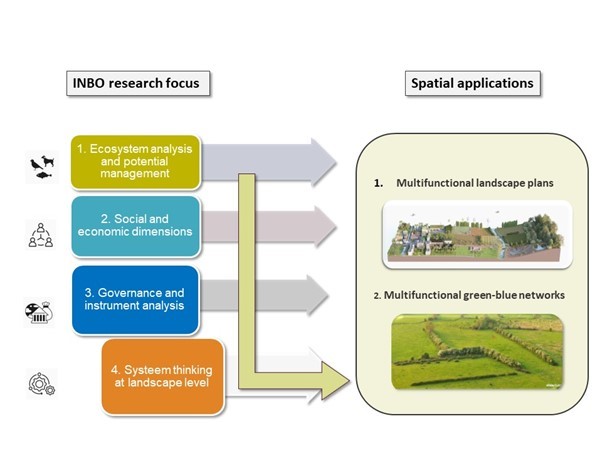Nature-inclusive landscape planning
We focus in this research challenge on integrated or area-based projects. These are spatially delineated projects in which different actors work together through a participatory process. Examples incluse landscape parks, water landscapes, complex projects, management plans of flood plain or multifunctional forests, and multifunctional management of hedgerows or infrastructure works.
INBO wants to scientifically support such participatory area-based processes and help build feasible, sustainable and nature-inclusive solutions. We aim as much as possible for win-win situations between the different local actors . In doing so, we take into account the carrying capacity of the landscape, landscape history and the nature and climate objectives of Flemish and European policy. In this way, we can contribute to the needs of local actors and of society as a whole, while creating opportunities for nature. Based on pilot projects, we formulate recommendations for policy and practice.
We focus on:
- Ecosystem analysis and potential management at landscape level
Local land-use interventions often have far-reaching impacts. To underpin nature-inclusive landscapes, we study the ecology of the landscape, how water and nutrients flow through the land, and potential landscape-level management interventions. Here, we draw on knowledge from other research challenges, such as Towards healthy ecosystems, Towards functional nature networks, Ecological water system restoration and Agroecology and nature restoration. - Social and economic dimensions of multifunctional landscapes
If we want area-based processes to succeed, it is essential to better understand what different people think of the current landscape and how they would like to see it in the future. We investigate the values that stakeholders assign to the various landscape functions and see if there are conflicts between the different land uses. We then look for potential solutions that are acceptable to the different land users, including viable business models. We also look for effective ways to forge successful and inclusive partnerships. - Governance and instrument analysis
Area-based development is often hindered by the complex policy context. Through case studies, we aim to provide answers to questions such as: How can different area-based initiatives and sectoral objectives be better aligned? How can government organisations and policy instruments better respond to the motivations of local actors? - System thinking at landscape level
Multifunctional landscapes are complex systems. Through socio-ecological systems thinking and future envisioning, we want to contribute to scenarios for sustainable development of multifunctional landscapes. This can strategically support decision-making and long-term visions of area-based development.

